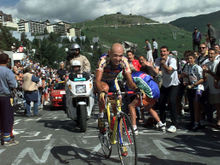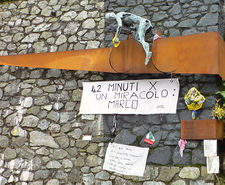Marco Pantani
 |
||||||||||||||||
| Personal information | ||||||||||||||||
|---|---|---|---|---|---|---|---|---|---|---|---|---|---|---|---|---|
| Full name | Marco Pantani | |||||||||||||||
| Nickname | 'Il Pirata' (The pirate) | |||||||||||||||
| Date of birth | 13 January 1970 | |||||||||||||||
| Place of birth | Cesena, Italy | |||||||||||||||
| Date of death | 14 February 2004 (aged 34) | |||||||||||||||
| Height | 1.72 m (5 ft 7 1⁄2 in) | |||||||||||||||
| Weight | 57 kg (130 lb; 9.0 st) | |||||||||||||||
| Team information | ||||||||||||||||
| Discipline | Road | |||||||||||||||
| Role | Rider | |||||||||||||||
| Rider type | Climbing specialist | |||||||||||||||
| Professional team(s) | ||||||||||||||||
| 1992–1996 1997–2003 |
Carrera Mercatone Uno |
|||||||||||||||
| Major wins | ||||||||||||||||
|
||||||||||||||||
|
||||||||||||||||
| Infobox last updated on 24 July 2008 |
||||||||||||||||
Marco Pantani (13 January 1970–14 February 2004) was an Italian road racing cyclist, one of the best climbers in professional road bicycle racing. He won the Tour de France and the Giro d'Italia in 1998. He was known as 'Il Pirata' (the pirate) because of the bandana he wore. His career was beset by drug abuse allegations after a failed blood test in the 1999 Giro d'Italia. He died after a cocaine overdose in 2004.
Contents |
The first victories
Pantani was born in Cesena, Romagna. At 1.72m and 57 kg (5 ft 8 in, 126 lb/9 st),[1] Marco Pantani had the classic build for a mountain climber. As an amateur, he won the 1992 Baby Giro by his climbing.[2] In 1994, during his second Giro d'Italia, he won two mountain stages and came second behind Eugeni Berzin but ahead of Miguel Indurain, who won the two previous Giros. Pantani first rode the Tour de France in 1994, coming third. In 1995 he was hit by a car while training but rode the Tour and won stages at Alpe d'Huez and Guzet Neige. He came third in the 1995 world championship in Colombia. Shortly after returning to Italy he collided head-on with a car during the Italian Milano–Torino race. He broke his leg in two places.[3]
Pantani's climbing style was to stay on the lower section of his handlebars, often pedaling out of the saddle. Bianchi built for him a bike with a longer steerer tube for higher handlebars.[4]
1997-1998
Pantani returned to the Giro in 1997 but fell after a black cat ran in front of him during one of the first stages.[5] He returned to action at the Tour and won two stages in the Alps and Pyrénées, establishing a record time for the climb of Alpe d'Huez. Jan Ullrich won, with Pantani third behind Richard Virenque.

The following year, 1998, Pantani won the Giro d'Italia for the first time, beating Pavel Tonkov and Alex Zülle. In the Tour de France, Pantani pulled back early time losses to Ullrich and then defeated Ullrich by almost nine minutes in the mountain stage, from Grenoble to Les Deux Alpes, via the Col de la Croix de Fer and Col du Galibier. Pantani became the first Italian since Felice Gimondi (1965) to win the Tour.
The late years
Things turned bad for Pantani towards the end of the 1999 Giro. He won four stages, with his challengers far away, and only one mountain stage left: however, he was disqualified for a high red blood-cell count which suggested EPO. Later, it was revealed he had a hematocrit level of 60 per cent after his crash in 1995, above the later limit of 50.[6] Pantani stayed away from the rest of the year's races.
In 2000 he was back in the Giro after deciding to ride only the day before the race started. He lost time and could not attack until the last mountain stage to Briançon, in which he helped his teammate Stefano Garzelli to win. Pantani rode the 2000 Tour de France. He was off the pace but matched Lance Armstrong on Mont Ventoux, leaving the field behind. Armstrong eased and appeared to allow Pantani the stage victory; Pantani resented the gesture, causing bad feelings between the two exacerbated when Armstrong referred to him as Elefantino (Italian for 'little elephant'), a reference to his prominent ears.[7] In that same Tour, he won another stage, to Courchevel, leaving everyone behind. It turned out to be his last victory. On the next stage, over the hors categorie Col de Joux-Plane, Pantani broke away to crush Armstrong. Instead, he suffered stomach problems and dropped out. He never raced the Tour again.[8]
After that he raced sporadically in 2001 and 2002, morally defeated from doping suspicions. He seemed to be back during the Giro of 2003, where he did not win any stage but finishing well-placed in the mountains.[9]
Pantani entered a clinic in northern Italy in June 2003, suffering clinical depression.[10]

"He's gone" – front page announcement in La Gazzetta dello Sport.
|

Shrine to Pantani on the Mortirolo Pass.
|
Death
During the early evening of 14 February 2004 Pantani was found dead at a hotel in Rimini, Italy. An autopsy revealed he had a cerebral edema and heart failure, and a coroner's inquest revealed acute cocaine poisoning. Mario Cipollini said "I am devastated. It's a tragedy of enormous proportions for everyone involved in cycling. I'm lost for words."[11]
Pantani was buried in his hometown, Cesenatico. Twenty thousand mourners were at his funeral, during which his manager Manuela Ronchi read from his diary:
| “ | For four years I've been in every court, I just lost my desire to be like all the other sportsmen, but cycling has paid and many youngsters have lost their faith in justice. All my colleagues have been humiliated, with TV cameras hidden in their hotel rooms to try and ruin families. How could you not hurt yourself after that? | ” |
Miguel Indurain, five-times Tour de France winner, paid tribute by saying: "He got people hooked on the sport. There may be riders who have achieved more than him, but they never succeeded in drawing in the fans like he did."[13]
Giro d'Italia's organizers decided to dedicate a mountain pass to Pantani's memory every year. In the 2004 edition, the first Cima Pantani was Mortirolo Pass, a pass that played a key role in Pantani's history. When it was included in the Giro for the third time in 1994 Pantani attacked, leaving everyone behind, to earn win at Aprica.
The 16th stage of 2004 Tour de France was dedicated to Pantani's memory. This stage was an individual time trial up to Alpe d'Huez, where Marco Pantani won in 1995 and 1997.[14]
Alleged drug use
Matt Rendell's biography of Pantani suggests Pantani used recombinant erythropoietin (rEPO) throughout his professional career. It alleges that seasonal levels of hematocrit from several sources showed variations which exceeded those possible naturally, and that Pantani's great victories were probably with levels up to 60 per cent.[15] However, his autopsy ruled out the continued use of drugs such as EPO.[16]
Major results
Source:[17]
Tour de France results
- 1994: 3rd overall; 2nd mountains classification;
 1st young rider classification (Maillot blanc)
1st young rider classification (Maillot blanc) - 1995: 13th overall;
 1st young rider classification (Maillot blanc); Stage 10 and 14 wins
1st young rider classification (Maillot blanc); Stage 10 and 14 wins - 1997: 3rd overall; Stage 13 and 15 wins
- 1998:
 1st overall (maillot jaune); 7 days in maillot jaune; 2nd mountains classification; Stage 11 and 15 wins
1st overall (maillot jaune); 7 days in maillot jaune; 2nd mountains classification; Stage 11 and 15 wins - 2000: Did not finish; Stage 12 and 15 wins
Giro d'Italia results
- 1994: 2nd overall; 2nd young rider classification; 3rd mountains classification; Stage 14 and 15 wins
- 1998:
 1st overall (maglia rosa);
1st overall (maglia rosa);  1st mountains classification (maglia verde); Stage 14 and 19 wins
1st mountains classification (maglia verde); Stage 14 and 19 wins - 1999: Stage 8, 15, 19 and 20 wins
- 2000: 28th overall
- 2003: 14th overall
Other stage races and classics
- UCI Road World Championships Road Race (1995): 3rd (Bronze Medal)
- Vuelta a Murcia (1999): 1st overall
- Tour de Suisse (1995): Stage 9 win
- Setmana Catalana (1999): Stage 2 win
- Vuelta a Murcia (1998): 3rd overall; Stage 4a win
- Summer Olympics Men's Road Race (2000): 69th place
See also
- List of doping cases in cycling
References
- ↑ Marco PANTANI Cycling Profile
- ↑ Pantani dead at 34
- ↑ "The long, lonely road to oblivion". London: guardian.co.uk. March 7, 2004. http://observer.guardian.co.uk/osm/story/0,,1161002,00.html. Retrieved 21 September 2007.
- ↑ "Marco Pantani's 1998 Tour De France winning bike". Bianchi Forum. Bianchi. 2007-08-12. http://bianchi.com/community/forums/permalink/2048/1992/ShowThread.aspx. Retrieved 2008-07-20. "This bike features: ... Extra long steerer tube to raise handlebar position so he could climb in the drops."
- ↑ Abt, Samuel (1998-08-04). "Tour Champion Evokes Bygone Heroes in Italy". Sports (International Herald Tribune). http://www.iht.com/articles/1998/08/04/bike.t_1.php. Retrieved 2008-07-19. "... bad luck struck him again in the Giro in June 1997, when a black cat — yes, really — crossed the road and caused a mass crash of riders trying to swerve around it. Pantani went down and was out until the Tour a month later."
- ↑ www.cyclingnews.com news and analysis
- ↑ Race Leader Is Angered by Italian's Remarks Over Ventoux Finish : Armstrong's Pique at Pantani - International Herald Tribune
- ↑ Ruibal, Sal (2005-07-05). "Armstrong avoids hoopla". USA Today. http://www.usatoday.com/sports/cycling/tourdefrance/2005-07-04-armstrong-hoopla_x.htm. Retrieved 2010-05-12.
- ↑ http://www.repubblica.it/online/sport/girobis/zoncolan/zoncolan.html (Italian)
- ↑ Marco Pantani remembered
- ↑ "Pantani found dead in Italian hotel". velonews.com. February 14, 2004. http://www.velonews.com/news/fea/5556.0.html. Retrieved 11 September 2007.
- ↑ "Italy mourns cyclist Pantani". cbc.ca. February 18, 2004. http://www.cbc.ca/sports/story/2004/02/18/pantani040218.html. Retrieved 11 September 2007.
- ↑ "Indurain mourns Pantani". news.bbc.co.uk. February 15, 2004. http://news.bbc.co.uk/sport2/hi/other_sports/cycling/3489929.stm. Retrieved 11 September 2007.
- ↑ "Cycling : Armstrong is king of toughest hill". iht.com/. July 23, 2004. http://www.iht.com/articles/2004/07/23/bike_14.php. Retrieved 11 September 2007.
- ↑ Rendell, Matt (2006-06-22). The Death of Marco Pantani. Weidenfeld & Nicolson. ISBN 978-0297850960.
- ↑ {{The autopsy result (in Italian) [1]}}
- ↑ Marco Pantani profile at Cycling Archives
External links
Further reading
- Fiore, Stefano (2004). Pantani Vive (with photography by Emanuele and Stefano Sirotti). De Eecloonaar. ISBN 9789077562055.
- Rendell, Matt (2006). The Death of Marco Pantani – A Biography. Weidenfeld & Nicholson. ISBN 9780297850960.
- Ronchi, Manuela (2004). Un uono in fuga – la vera storia di Marco Pantani. Rizzoli. ISBN 9788817003674.
- Ronchi, Manuela (2005). Man on the Run – the Life and Death of Marco Pantani. Robson Books. ISBN 9781861059208.
- Wilcockson, John (2005). Marco Pantani – the Legend of a Tragic Champion (with photography by Graham Watson). Velo Press. ISBN 9781931382656.
| Awards and achievements | ||
|---|---|---|
| Preceded by |
Vélo d'Or 1998 |
Succeeded by |
|
|||||
|
|||||
|
|||||